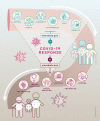The hygiene hypothesis, the COVID pandemic, and consequences for the human microbiome
- PMID: 33472859
- PMCID: PMC8017729
- DOI: 10.1073/pnas.2010217118
The hygiene hypothesis, the COVID pandemic, and consequences for the human microbiome
Erratum in
-
Correction for Finlay et al., The hygiene hypothesis, the COVID pandemic, and consequences for the human microbiome.Proc Natl Acad Sci U S A. 2021 Mar 16;118(11):e2102333118. doi: 10.1073/pnas.2102333118. Proc Natl Acad Sci U S A. 2021. PMID: 33836617 Free PMC article. No abstract available.
Abstract
The COVID-19 pandemic has the potential to affect the human microbiome in infected and uninfected individuals, having a substantial impact on human health over the long term. This pandemic intersects with a decades-long decline in microbial diversity and ancestral microbes due to hygiene, antibiotics, and urban living (the hygiene hypothesis). High-risk groups succumbing to COVID-19 include those with preexisting conditions, such as diabetes and obesity, which are also associated with microbiome abnormalities. Current pandemic control measures and practices will have broad, uneven, and potentially long-term effects for the human microbiome across the planet, given the implementation of physical separation, extensive hygiene, travel barriers, and other measures that influence overall microbial loss and inability for reinoculation. Although much remains uncertain or unknown about the virus and its consequences, implementing pandemic control practices could significantly affect the microbiome. In this Perspective, we explore many facets of COVID-19-induced societal changes and their possible effects on the microbiome, and discuss current and future challenges regarding the interplay between this pandemic and the microbiome. Recent recognition of the microbiome's influence on human health makes it critical to consider both how the microbiome, shaped by biosocial processes, affects susceptibility to the coronavirus and, conversely, how COVID-19 disease and prevention measures may affect the microbiome. This knowledge may prove key in prevention and treatment, and long-term biological and social outcomes of this pandemic.
Keywords: COVID-19; hygiene hypothesis; microbiome.
Conflict of interest statement
The authors declare no competing interest.
Figures

References
MeSH terms
Substances
Grants and funding
LinkOut - more resources
Full Text Sources
Other Literature Sources
Medical

